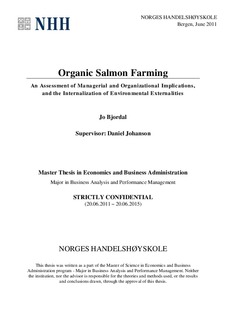Organic Salmon Farming : An Assessment of Managerial and Organizational Implications, and the Internalization of Environmental Externalities
Abstract
Organic salmon farming has emerged in the wake of tightened competition in conventional
production as an initiative to internalize many of the claimed externalities most people associate
with modern aquaculture. However, as Norwegian producers have largely dominated the
commoditized salmon industry, in terms of volumes and cost-effectiveness, their incentives for
diversification are confined (Georgakopoulos and Thomson, 2005).
Two case companies were chosen to explore the motives and means for diversifying into organic
salmon farming in Norway, and to examine the managerial and organizational implications of
this strategic decision. The project draws upon extant theories pertaining to the subjects of
industry-based and resource-based strategy, management accounting and environmental
management systems.
A qualitative research approach was taken to gather primary data, in the form of five semistructured
in-depth interviews. The respondents represented various management positions in
two Norwegian aquaculture companies. An exploratory case study design was applied to enable
cross-case comparisons and to fortify the findings. Secondary data, regarding company
characteristics and related studies, was also collected to strengthen the results.
The research findings indicate that successful implementation is reliant on distinctive resources
pertaining to human capital, well-integrated quality systems and cost control. The shift was
made in conformity with the overall firm strategies rather than as a response to external
pressure from various stakeholders. Management accounting played a key role in assessing,
allocating and actively reducing the environmental costs associated with organic production. The
implementation did not activate any large investments and the price premiums offset most of
the excess costs related to certification compliance, enabling the companies to achieve margins
which equaled those in conventional production.
Organic certification was, through the presence and usage of the abovementioned firm
resources, revealed as an integrating mechanism for environmental issues in the organizations.
However, the environmental performance of organic production was limited by a perceived
disparity between the intended meaning of various certification standards and their practical
implications, which in turn confines the purpose of advanced management accounting as a
means for enhancing environmental performance.
